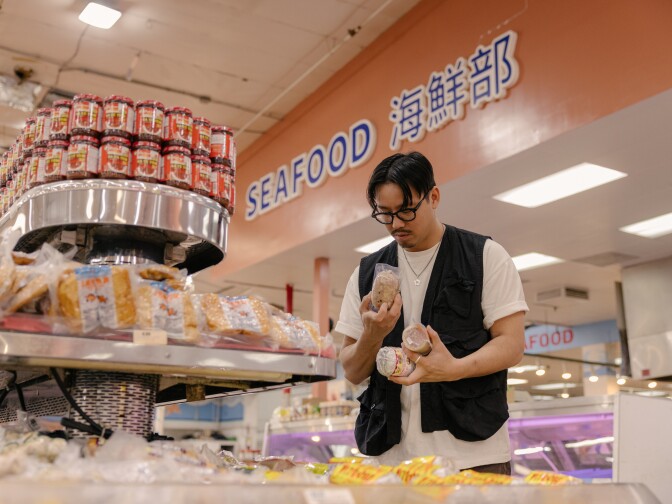This story is free to read because readers choose to support LAist. If you find value in independent local reporting, make a donation to power our newsroom today.
50 years after Saigon's fall, a Vietnamese pilot's decision saved his life and dozens of others

Bảo Trương’s parents fled Vietnam in 1975 following the war there. His dad, Thuận Trương, is a former pilot for the South Vietnamese Air Force, who evacuated nearly 100 people to Thailand just before the fall of Saigon.
Thuận Trương detests the current Vietnamese government, mourning the country that existed before the war. But Bảo Trương desperately wants to live in today’s Vietnam.
Emily Kwong, host of the podcast Inheriting, helps father and son connect over the country they both long for, but in different ways. The show about Asian American and Pacific Islander families, which explores how one event in history can ripple through generations.
Two very different views
Bảo Trương says he wouldn’t exist if the Vietnam War hadn’t happened. Both his parents came to the U.S. as refugees following the war and met in California.
“If it wasn’t for April 30, 1975, our lives would be completely different,” he says. “It’s something that is woven into the texture of who I am, and I think woven into the texture of who we are as Vietnamese people, as Vietnamese Americans.”

Bảo Trương’s dad, Thuận Trương, now writes poetry and music about his experience during the war, often detailing his longing for the Vietnam of his childhood. And Thuận Trương’s personal and political contempt for the Communist Party of Vietnam weighs heavily on their family. The Vietnamese government took over the Trương family’s land and imposed a system of prison camps, which Thuận Trương blames for his brother’s death.
“The communists, I can't stand to see them. If I see them, I get sick. I get angrier,” Thuận Trương says.
Bảo Trương feels very differently about today’s Vietnam.
I have this concept of inherited nostalgia, of being homesick for a place you've never known, a place that's never been home.
In 2016, he went on a solo trip to the country. He made new friends and gathered footage for an upcoming film project. Bảo Trương was born in California and grew up in Texas, where he often felt a kind of longing and displacement. Vietnam, on the other hand, feels like home, so much so that he wants to move there.
“I have this concept of inherited nostalgia, of being homesick for a place you've never known, a place that's never been home,” he says.
Bảo Trương currently lives in Los Angeles and has tried to find his sense of place and connection with his culture by doing things like starting a dinner pop-up series in Los Angeles called Mr. Jong. On “Mr. Jong” nights, he and his friends Jeff Tang, Ralph Hsiao, and Chraz Nguyen cook classic Vietnamese and Taiwanese dishes for a growing diasporic community. But even this isn’t enough to address Bảo longing for Vietnam.
“It doesn’t scratch the itch,” he says. “That is only going to be satiated by being in Vietnam.”
But Bảo Trương has struggled to tell his dad about this dream. He opens up to his dad for the first time on Inheriting.
Bảo Trương tells his father, “The Saigon you knew just being forever lost in the past … you wouldn't think I would relate to this, but I do. I swear to God, I've inherited your nostalgia.
A brief history of the Vietnam War and the fall of Saigon
The fall of Saigon marked the end of a two decade-long civil war between North and South Vietnam. The war started after communist fighters in the North overthrew French colonialist rule in 1954. Vietnam was subsequently split in two: the Communist North and the Nationalist South, giving way to conflict.
At the time, the U.S. provided substantial military aid to South Vietnam, which held one of the largest air forces in the world. Thuận Trương was a pilot for the South, transporting cargo and people during the war. But in December 1974, North Vietnam launched a campaign that led to the takeover of the country’s capital, Saigon.
On April 28, 1975, North Vietnamese troops bombed Tan Son Nhut Air Base. The following day, thousands of Vietnamese and Americans fled the country by aircraft and ships. Thuận Trương, who was stationed in Saigon, helped airlift evacuees out of the country in a C-130 aircraft. He says a hundred people packed into the plane before they had to shut the doors, but he wasn’t sure the plane could take off under the weight of all the people onboard.
“I thought we were going to fall. The airplane was shaking so bad,” Thuận Trương recalls. “I thought we were about [to] die.”
A couple days later, North Vietnam captured Saigon after the surrender of South Vietnamese Gen. Dương Văn Minh. The new regime renamed Saigon to Ho Chi Minh City.
Listen to the full story
Listen to more episodes at LAist.com/Inheriting or subscribe on your app of choice here.
Updated April 30, 2025 at 10:56 AM PDT
This story was revised slightly to reflect the 50th anniversary of the fall of Saigon.










